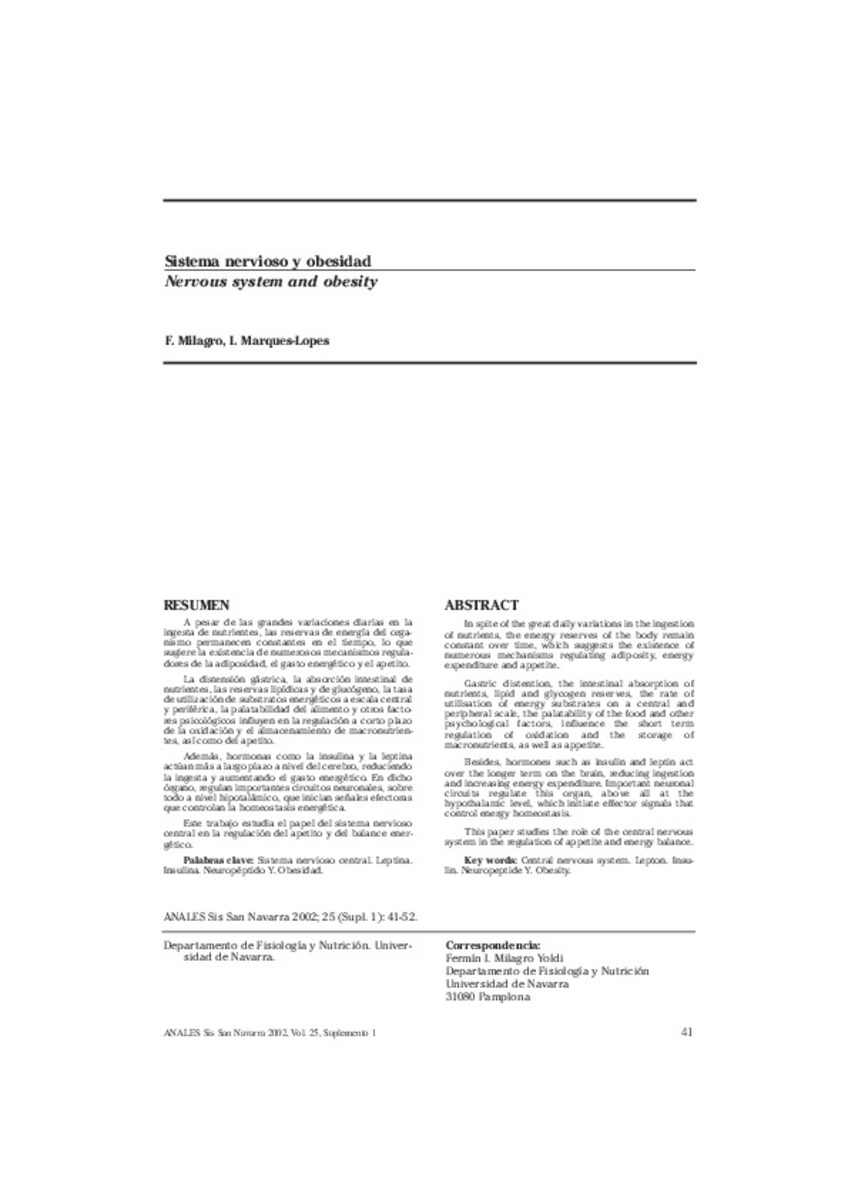Full metadata record
| DC Field | Value | Language |
|---|---|---|
| dc.creator | Milagro-Yoldi, F.I. (Fermín Ignacio) | - |
| dc.creator | Marques-Lopes, I. (Iva) | - |
| dc.date.accessioned | 2022-10-03T12:57:30Z | - |
| dc.date.available | 2022-10-03T12:57:30Z | - |
| dc.date.issued | 2002 | - |
| dc.identifier.citation | Milagro, F.I. (Fermín I); Marques-Lopes, I. (Iva). "Sistema nervioso y obesidad". Anales del Sistema Sanitario de Navarra. 25 (Supl. 1), 2002, 41 - 52 | es_ES |
| dc.identifier.issn | 1137-6627 | - |
| dc.identifier.uri | https://hdl.handle.net/10171/64364 | - |
| dc.description.abstract | A pesar de las grandes variaciones diarias en la ingesta de nutrientes, las reservas de energía del organismo permanecen constantes en el tiempo, lo que sugiere la existencia de numerosos mecanismos reguladores de la adiposidad, el gasto energético y el apetito. La distensión gástrica, la absorción intestinal de nutrientes, las reservas lipídicas y de glucógeno, la tasa de utilización de substratos energéticos a escala central y periférica, la palatabilidad del alimento y otros factores psicológicos influyen en la regulación a corto plazo de la oxidación y el almacenamiento de macronutrientes, así como del apetito. Además, hormonas como la insulina y la leptina actúan más a largo plazo a nivel del cerebro, reduciendo la ingesta y aumentando el gasto energético. En dicho órgano, regulan importantes circuitos neuronales, sobre todo a nivel hipotalámico, que inician señales efectoras que controlan la homeostasis energética. Este trabajo estudia el papel del sistema nervioso central en la regulación del apetito y del balance energético. | es_ES |
| dc.description.abstract | In spite of the great daily variations in the ingestion of nutrients, the energy reserves of the body remain constant over time, which suggests the existence of numerous mechanisms regulating adiposity, energy expenditure and appetite. Gastric distention, the intestinal absorption of nutrients, lipid and glycogen reserves, the rate of utilisation of energy substrates on a central and peripheral scale, the palatability of the food and other psychological factors, influence the short term regulation of oxidation and the storage of macronutrients, as well as appetite. Besides, hormones such as insulin and leptin act over the longer term on the brain, reducing ingestion and increasing energy expenditure. Important neuronal circuits regulate this organ, above all at the hypothalamic level, which initiate effector signals that control energy homeostasis. This paper studies the role of the central nervous system in the regulation of appetite and energy balance | es_ES |
| dc.language.iso | spa | es_ES |
| dc.publisher | Gobierno de Navarra | es_ES |
| dc.rights | info:eu-repo/semantics/openAccess | es_ES |
| dc.subject | Sistema nervioso central | es_ES |
| dc.subject | Leptina | es_ES |
| dc.subject | Insulina | es_ES |
| dc.subject | Neuropéptido Y | es_ES |
| dc.subject | Obesidad | es_ES |
| dc.subject | Central nervous system | es_ES |
| dc.subject | Lepton | es_ES |
| dc.subject | Insulin | es_ES |
| dc.subject | Neuropeptide Y | es_ES |
| dc.subject | Obesity | es_ES |
| dc.title | Sistema nervioso y obesidad | es_ES |
| dc.title.alternative | Nervous system and obesity | es_ES |
| dc.type | info:eu-repo/semantics/article | es_ES |
| dc.description.note | Creative Commons Reconocimiento-CompartirIgual 4.0 Internacional | es_ES |
| dc.identifier.doi | 10.23938/ASSN.0813 | - |
| dadun.citation.endingPage | 52 | es_ES |
| dadun.citation.number | Supl. 1 | es_ES |
| dadun.citation.publicationName | Anales del Sistema Sanitario de Navarra | es_ES |
| dadun.citation.startingPage | 41 | es_ES |
| dadun.citation.volume | 25 | es_ES |
| dc.identifier.pmid | 12861269 | - |
Files in This Item:
Statistics and impact
Items in Dadun are protected by copyright, with all rights reserved, unless otherwise indicated.






